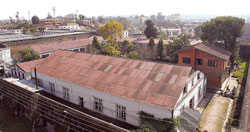 Unreleased findings from Kathmandu?s Central Jail suggest there might be an HIV crisis building in the prison.
Unreleased findings from Kathmandu?s Central Jail suggest there might be an HIV crisis building in the prison.
In February this year the Community Centre for Justice and Development (CCJD) conducted a blood drive among prisoners in the Central Jail and Bhadra Jail as part of a social service initiative. Of the 77 prisoners from the Central Jail who donated blood, the samples of 27 came back HIV positive after mandatory testing by the Blood Bank. Twenty one of the 121 prisoners who gave blood from Bhadra Jail also tested positive for HIV. Nepal is estimated to have an HIV positive population of over 70,000 , although there are only 8,000 reported cases.
These figures should be cause for alarm. Instead, they were brushed under the carpet. The logistics of all blood donation drives in Nepal, from collection to testing, are organised by the Nepal Red Cross Society. This is why the CCJD?s Shyam Pokharel was told after the camp that some donors were HIV positive, and that there should be no more blood drives among prisoners. The Nepal Red Cross Society issued a notice ordering the Blood Bank not to collect blood from prisoners, but never made a public report. 
While Pokharel?s request for a list of infected prisoners could obviously not be honoured for ethical reasons, the Red Cross has not informed the infected prisoners of their status either.
Dr Manita Karnikar, director of the Blood Bank, acknowledged that there were ?problems? with many of the prisoners but requested that the numbers not be mentioned and the matter not be written about, as it might ?cause problems?. Karnikar argues that the Blood Bank is just following WHO guidelines on not collecting blood from infected groups.
However, sources at the Blood Bank tell us that the organisation is not, in fact, following all WHO safety guidelines and fears greater scrutiny will reveal loopholes in its own procedures.
The Blood Bank apparently ?did not think it necessary? to inform the prison wardens or officials such as Dr Rajendra Pant, chief of the National AIDS and STD Prevention Centre. Pant says he?s heard only rumours of prisoners being infected.
Central Jail chief Rishikesh Niraula says there are a few HIV positive prisoners, but claims to have not been told anything more. ?The Blood Bank should have informed us as soon as they ran the tests. We could?ve started preventing the spread of infection, but now the problem remains hidden because they refuse to share information with us,? he says. The Central Jail, which has its own government hospital to treat ill prisoners, has not followed up with tests of its own.
Pokharel argues that those who donated blood did so willingly and that most were likely unaware of the state of their health. ?Look at the numbers,? he says, ?and these were only the willing prisoners. It?s hardly a stretch to guess that there might be a lot more infections than this.?
No one we spoke to at the prison or prisoner welfare groups would speculate on why or how so many prisoners are infected. Niruala mentions offhand that when an NGO tried to distribute condoms, most prisoners had refused the suggestion that they were involved in gay sex.


